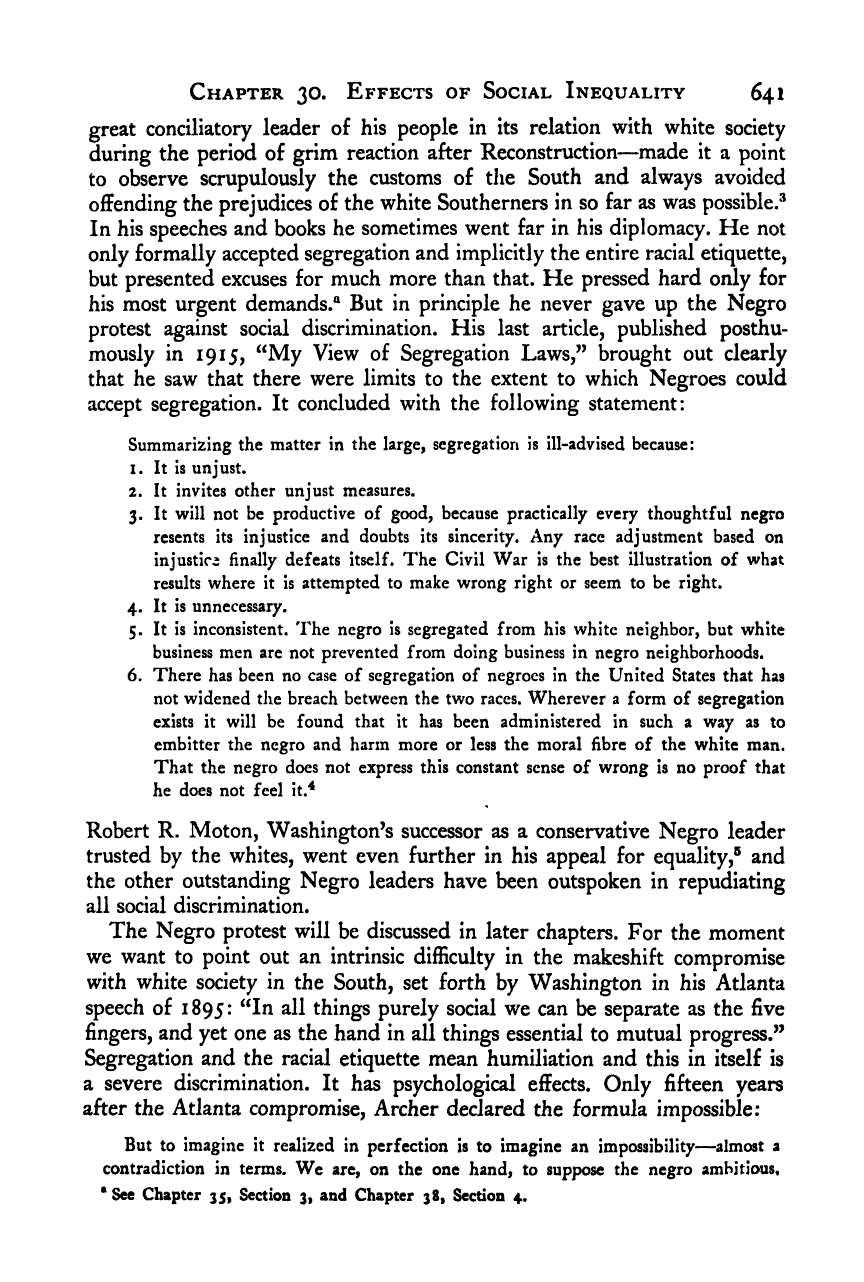Note: Gunnar Myrdal died in 1987, less than 70 years ago. Therefore, this work is protected by copyright, restricting your legal rights to reproduce it. However, you are welcome to view it on screen, as you do now. Read more about copyright.
Full resolution (TIFF) - On this page / på denna sida - VII. Social Inequality - 30. Effects of Social Inequality - 1. The Incidence of Social Inequality

<< prev. page << föreg. sida << >> nästa sida >> next page >>
Below is the raw OCR text
from the above scanned image.
Do you see an error? Proofread the page now!
Här nedan syns maskintolkade texten från faksimilbilden ovan.
Ser du något fel? Korrekturläs sidan nu!
This page has never been proofread. / Denna sida har aldrig korrekturlästs.
Chapter 30. Effects of Social Inequality 641
great conciliatory leader of his people in its relation with white society
during the period of grim reaction after Reconstruction—made it a point
to observe scrupulously the customs of the South and always avoided
offending the prejudices of the white Southerners in so far as was possible.’*
In his speeches and books he sometimes went far in his diplomacy. He not
only formally accepted segregation and implicitly the entire racial etiquette,
but presented excuses for much more than that. He pressed hard only for
his most urgent demands.® But in principle he never gave up the Negro
protest against social discrimination. His last article, published posthu-
mously in 1915, “My View of Segregation Laws,” brought out clearly
that he saw that there were limits to the extent to which Negroes could
accept segregation. It concluded with the following statement:
Summarizing the matter in the large, segregation is ill-advised because:
1. It is unjust.
2. It invites other unjust measures.
3. It will not be productive of good, because practically every thoughtful negro
resents its injustice and doubts its sincerity. Any race adjustment based on
injustice finally defeats itself. The Civil War is the best illustration of what
results where it is attempted to make wrong right or seem to be right.
4. It is unnecessary.
5. It is inconsistent. The negro is segregated from his white neighbor, but white
business men are not prevented from doing business in negro neighborhoods.
6. There has been no case of segregation of negroes in the United States that has
not widened the breach between the two races. Wherever a form of segregation
exists it will be found that it has been administered in such a way as to
embitter the negro and harm more or less the moral fibre of the white man.
That the negro does not express this constant sense of wrong is no proof that
he does not feel it.”*
Robert R. Moton, Washington’s successor as a conservative Negro leader
trusted by the whites, went even further in his appeal for equality,® and
the other outstanding Negro leaders have been outspoken in repudiating
all social discrimination.
The Negro protest will be discussed in later chapters. For the moment
we want to point out an intrinsic difficulty in the makeshift compromise
with white society in the South, set forth by Washington in his Atlanta
speech of 1895: “In all things purely social we can be separate as the live
fingers, and yet one as the hand in all things essential to mutual progress.”
Segregation and the racial etiquette mean humiliation and this in itself Is
a severe discrimination. It has psychological effects. Only fifteen years
after the Atlanta compromise, Archer declared the formula impossible:
But to imagine it realized in perfection is to imagine an impossibility—almost a
contradiction in terms. We are, on the one hand, to suppose the negro ambitious,
* See Chapter 35, Section 3, and Chapter 38, Section 4.
<< prev. page << föreg. sida << >> nästa sida >> next page >>